Everton Independent Research Data
GRADE TWO STANDS SEATING FULLY BOOKED
The Liverpool Echo and Evening Express, Thursday, July 1 1965
WORLD CUP AT GOODISON
By Leslie Edwards
All the grade two stand seating for four of the World Cup matches to be played at Goodison Park next summer have been disposed of. The season ticket rate for them was £4 15s. County F.A’s season ticket holders and applications from foreign F.A’s had priority for these tickets. A special office has been set up at Goodison Park to deal with applications for grade one seats, sale of which began officially this morning. While the demand for these at White City, London, box office headquarters of the tournament, was very heavy, Mr. Bill Dickinson, the Everton secretary, said to-day that demands at Everton were only “steady.” As no tickets will be available for actual distribution for many months, for reasons of security intending purchasers are advised that no personal applications are being dealt with at any of the centres. All applications, accompanied by cheques or postal orders, should be made by post and receipts-vouchers for the amounts enclosed will be despatched as soon as the World Cup organisation staff can deal with the mass of mail already received.
F.A. TO DEAL WITH SUBSTITUTION TO-MORROW
The Liverpool Echo and Evening Express- Friday, July 2, 1965
By Leslie Edwards
The Football Association, at their summer council meeting at Folkestone to-morrow, will consider the request of the Football League for the use of substitutes. The League want the following addition to their regulations: "A club may, of its discretion, use one substitute player of any time in a League match because of injury, except to replace a player who has been suspended from the game by the referee. The substitution can only be made when play has stopped for any reason and the referee has given permission. Only one substitution by each side will be permitted in any match and the substitute player shall be nominated prior to the commencement of the game." The Football League decided to ask for substitutes when they held their annual meeting in May. Although my line is an unpopular one, I hope the F A. rule against the League's proposal, which is bound to lead to a great deal of jiggery-pokery. How long, one wonders, before the League seek authority for the substitution of a player sent off for misconduct? That is the logical sequence if the present trend continues. A line must be drawn between the interest and entertainment of followers of football and what is sound and good for the competing teams. Spectators claim that any match in which one team finishes with 10 men, due to injury, is spoiled; yet the record book teems with cases of where 10 have beaten 11 and victory has been all the more praiseworthy. Football championships are not held primarily for the entertainment of the public. To try to remove all element of chance reduces the attractiveness of the game still further. Football authority should be more occupied trying to convince players that a change of heart in many directions is what is going to improve the image of the game-not opening the door for substitutes on a Continental scale. The “injustice” of playing a man short through injury may still arise even when one substitute has been introduced. It could happen that the substitute would be off the field within five minutes of taking his place… Presumably the League would then seek to substitute one substitute by another!
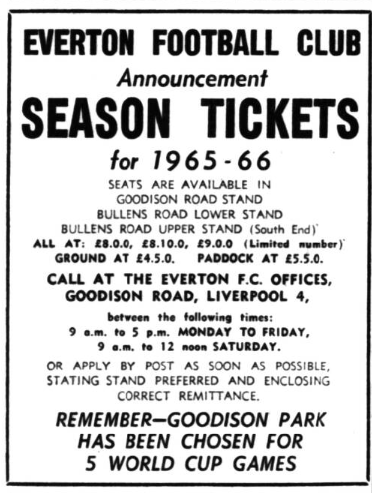
JIMMY GAULD WINS HIS APPEAL ON £5,000 COSTS
The Liverpool Echo and Evening Express- Friday, July 2 1965
EX-EVERTON FOOTBALLER TO PAY £380
GOALED FOR OUR YEARS
A £5,000 costs order against James Gauld, the former Everton and Mansfield Town footballer, sentenced to four years imprisonment at Nottingham Assizes last January for his part in the football conspiracy case, was to-day set aside by the Court of the Criminal Appeal. Substituting an order that Gauld pay £380, Lord Parker (the Lord Chief Justice) said the trial judge could order Gauld to pay only the costs Incurred in or about his own prosecution and conviction. Gauld pleaded guilty on the first day of the assize to conspiracy to defraud on 14 counts, in four indictments, and was sentenced a fortnight later, after the trial of professional and ex-professional footballers accused with him. "The only costs incurred in or about the conviction of Gauld were those in the magistrates' court and about' half a day which concerned him at the assize," said Lord Parker. Mr. A. E. James, Q.C., for the Crown, had very fairly conceded that the total figure under those heads would not have exceeded £380. Gauld, aged 35, of Berry Hill Road, Mansfield, appealed only against the costs order.
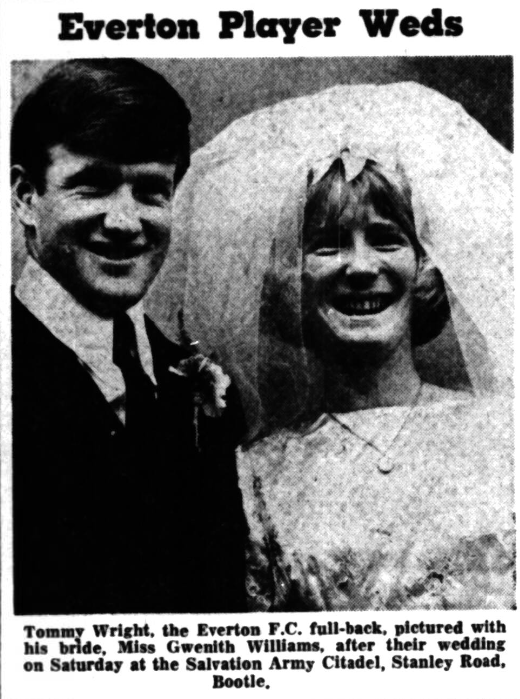
EVERTON REPORT PROFITS OF £13,331
The Liverpool Echo and Evening Express- Tuesday, July 6, 1965
INCOME FELL BY £50,000
EXPENSES LESS
By Harold Wolfe
Everton F.C. in their annual report, issued today, show a profit on last season of £13,331, compared with one of £15,912 the previous year. The club's gross income fell by more than £50,000. largely due to a drop in League gates from £180,246 to £134,273. Receipts from Cup-ties and other matches were also down from £98,221 to £73,493. Sales of season tickets were slightly up. They realised £78,572 as against £77,427. Gross expenditure fell from £293, 221 to £254,263, largely because of a big drop in ground expenses and maintenance and a reduction in players' wages and bonuses. Ground expenses were £64,203 (£85,618) and Players wages amounted to £76,687 (£71,418). Travel and match expenses also showed a drop to £15,683 (£19,321).
PITCH PROBLEM
In his annual report the chairman, Mr. John Moores, says the season was something of a disappointment as regards the playing pitch. There was a lot of rain during December and January and the soil warming wires made deep forking a slow process with the result that the pitch got puddled and heavy. The club is now in a position more quickly to protect the wires when forking is necessary and by this means hope to avoid a repetition of the disappointing state of the pitch experienced last season. To meet the requirements of the World Cup next 'summer, when Goodison Park will be the only ground outside Wembley to stage a semi-final. Everton have been called upon to provide even greater facilities than at present. These Involve improvement and extension of the Stanley Park stand and its surroundings, entailing the demolition of 12 houses in Goodison Avenue at an estimated cost of £128,000. Less than half of this figure will be provided by the Government and the Football Association, and the club will have to find the balance. The retiring directors. Messrs. N. W. Coffey. F. Micklesfield and J. Taylor, will be returned unopposed at the annual general meeting on Thursday, July 29, as no other nominations have been received.
PLAYER-MANGER
The Liverpool Echo and Evening Express- Tuesday, July 6 1965
NEW BRIGHTON POST FOR STAN BILLINGTON
New Brighton have appointed Stan Billington, the former Everton and Tranmere player, as their player-manager. Billington, who lives in Wallasey and was with Altrincham last season, will operate at centre half for Rakers for their first Cheshire League season.
McCARTHY MOVES
The Liverpool Echo and Evening Express- Wednesday 7 July, 1965
Skelmersdale United left half Phil McCarthy has signed on full-time professional forms for Oldham Athletic. Formerly on Everton’s books as an amateur, McCarthy, who lives in Huyton, was the target last season for several other League clubs, including Blackburn, Wrexham and Hull City.
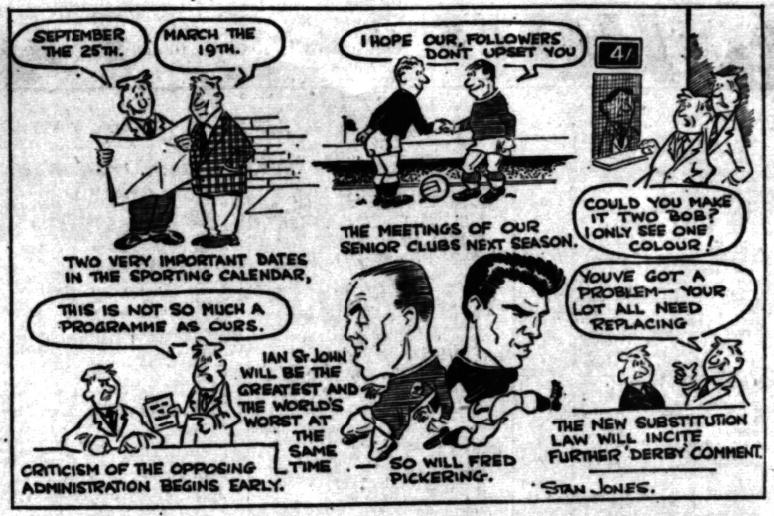
JOE MERCER NEW MANCHESTER CITY MANAGER
The Liverpool Echo and Evening Express- Tuesday, July 13 1965
LAST POST WAS WITH ASTON VILLA
PLAYED FOR EVERTON
Cheshire man
Mr. Joe Mercer, the 50-years-old former manager of Sheffield United and Aston Villa to-day became manager of Manchester City. Mr. Mercer, who was born at Ellesmere Port, started his football career with Everton and went on to captain England and Arsenal. He takes over from Mr. George Poyser, who resigned in April. Although he has been out of football for a year, Mr. Mercer said to-day that his health is now satisfactory and the doctors have given him the O’K. he will have a contract at Maine Road. The City chairman, Mr. Albert Alexander, said Mr. mercer would have full charge of the playing side. Mr. Walter Griffiths, the secretary, will continue to be responsible for all administration.
STARTED AT EVERTON
Mr. Mercer signed for Everton in September, 1932, and made his League debut for the Goodison park club in April, 1933 against Leeds United. He won his first England cap in the season 1938-39 season. After several years in the Forces, Mr. Mercer left Everton to join Arsenal in November, 1946. Under his captaincy the Gunners won the League championship in 1948 and 1953, and the F.A. Cup in 1950, when they beat Liverpool. His playing career ended on April 10, 1954 when he had the misfortune to break a leg following a collision with a colleague during a League match against Liverpool, at Highbury. For a time he went into business, running a large wholesale grocery firm in Wallasey, but football was in his blood to such an extent that he could not resist returning and in 1955, Mr. Mercer became manager of Sheffield United. He moved to Aston Villa in December, 1958 and stayed there until 12 months ago, when it was announced that he and the club had parted company by mutual consent. Mr. Mercer was manager of the England Under-23 touring team in 1963 but he did not manage the Under-23 tour in 1964 because he had been ordered to have a complete rest.
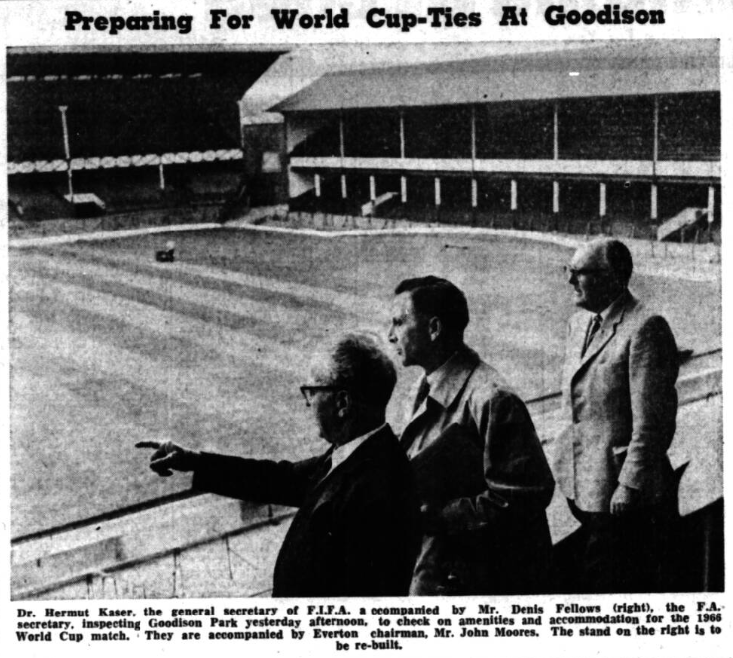
PITCH HAS BEEN EXTENDED
The Liverpool Daily Post- Friday, July 16, 1965
GOODISON PASSES ITS WORLD CUP EXAMINATION
Goodison Park has passed its World Cup examination with honours! Anyone who has seen the ground, trim and immaculate, will hardly be surprised at the excellent impression Everton’s home has created on Dr. Helmut Kaser, secretary general of F.I.F.A who made a tour of inspection yesterday accompanied by Mr. Ken Wilson, chief administrative officer Mr. Denis Follows, F.A. secretary, Mr. Ike Robinson, F.A. vice-president, Everton chairman Mr. John Moores, and members of the board. Five World Cup games are to be played at Goodison Park including a quarter final and a semi-final. To conform with World Cup requirements the pitch has been extended. Although the dressing room accommodation is superb by any standards, Everton intend to install more shower baths. “The work done at Goodison has been admirable and we are delighted by it,” said Dr. Kaser. “We are completely satisfied with everything we have seen and grateful for the co-operation we have received from Mr. Moores and his colleagues. After seeing the dressing rooms, medical room and stands the deputation inspected the Press centre which is to be established in the Supporters’ Club premises in City Road. They were informed that arrangements are being made for the installation on the ground of a scoreboard, on which will be recorded details of all other World Cup matches being played simultaneously with those at Goodison Park, so that the crowds will be given a complete picture. The party also sent some time at Hillsborough and Middlesbrough and today Dr. Kaser goes to Villa Park, before returning to Zurich. Mr. Follows commented; “If nothing more was done than the building of the footbridges over the railway at Old Trafford and the gymnasium behind the north stand at Hillsborough, it would all be worthwhile. “Every big cup in England should have a large indoor training centre. The ordinary pitch is unsuitable from November to February, from the point of view of developing a player’s basic skills, and on this point, I feel that compared with the Continent we are sadly lacking.”
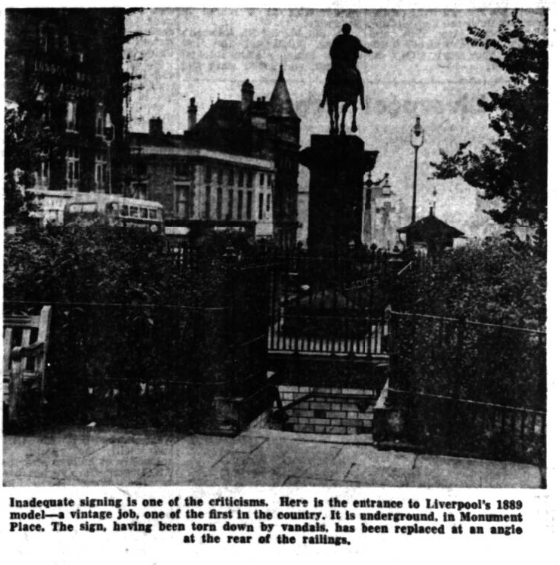
EVERTON TO PLAY IN NORWAY
The Liverpool Echo and Evening Express- Wednesday, July 21, 1965
PLANS FOR TWO GAMES
PRE-SEASON
By Leslie Edwards
When Everton F.C. players report for kitting out and training to-morrow, they will be told plans for a twomatch pre-season tour of Norway. Arrangements are close to completion for a match against the Norwegian national team, in Oslo, on August 9, and a further match against a representative side at Stavanger two days later. This, with a public practice match at Goodison Park, the date for which could be the pre-season Saturday on which Liverpool go to Old Trafford for the annual Charity Shield match, should get the Everton team sharp for the start of the new season.
CLOSE LINKS
Manager Harry Catterick said to-day: "We have close links with Norway through our matches with Valeringen and the fact that our coach, Ron Lewin, used to coach in Norway. " All our players have resigned, and two of them who suffered injury late last season—Dennis Stevens and Alex Young—have already done a fortnight's training at our improved training headquarters at Bellefield. " The Norwegian games, I feel, should be good pipe-openers." he added.
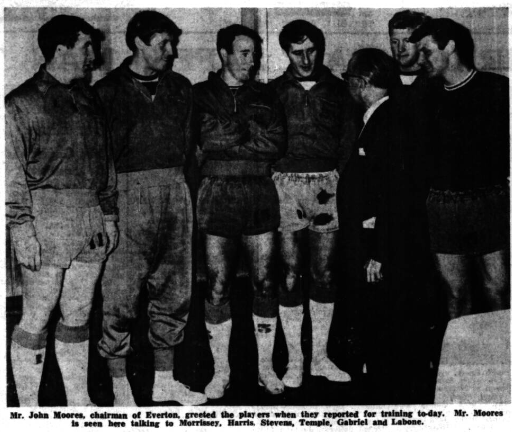
PROSPECTS GOOD, SAYS EVERTON CHAIRMAN
The Liverpool Echo and Evening Express- Thursday, July 22, 1965
GOODISON PLAYERS REPORT FOR TRAINING
By Leslie Edwards
Mr. John Moores (chairman) said he thought the club's prospects next season were very good when he welcomed Everton players returning to training at Goodison Park this morning. He said he wanted players to regard what he said seriously. If they worked hard and Put in 100 per cent effort they could command success. The club were demanding 100 per cent, effort and fitness from the staff and the fine coaching and training staff would help them to make the best of the ability they possessed. Each player could earn honours in the game. Rewards," said Mr. Moores. " have never been higher. We want to see you earn more and more. But we don't want it to be one-way traffic. We want something from you." "The image of the professional footballer." he continued, "over the last few seasons has become an little tarnished. I want you to try to help to improve it. It should be a player's proud boast to say: '”I am a professional footballer."' Of referees Mr. Moores said: "They are the boss. Too often you forget it. We want our players to exercise discipline. The fact that we are a skilful team makes it necessary not to play into the hands of rough opponents. You have got to stand behind the referee. We would punish You if you brought the good name of Everton into disrepute. "Everton are behind the F.A.'s campaign to get tough with offenders and their desire to exercise tighter control on games. We want you to develop a more responsible attitude to the game." Mr. Moores congratulated the various teams on their play last season and had some words of wisdom for the younger members of the staff. He counselled them: "You can't go out and smoke and drink and go to night clubs and play for England. It has to be one or the other." Mr. Moores said of the League and Cup competition: "Either will do for us. Both will be difficult to win, but we have the team to do it."
FAIRS CUP
The Inter Cities Fairs Cup, for which Everton are qualified, was a prestige tournament and a money-spinner and the club would want special effort from the players on the Continent. Mr. Harry Catterick (manager) disclosed that between now and the start of the season League referees would be asked to come to visit Goodison Park, not to lecture players on the game's laws, but to discuss players' problems in relation to the laws and any problems of referees in relation to players in their control. New apprentice professionals on the staff are: Alan Whittle, Liverpool and England schoolboys inside forward: Frank Thornton. Scottish boy international and inside forward, Robert Humphreys, a goalkeeper who has played for Cheshire boys: and Billy Brindle, former Liverpool and Lancashire schoolboys' half back. All are 15. Mr. Catterick said the club had now better reserve strength than ever before. Their success as a First Division club depended on the rate of development of the many fine young players on the staff.
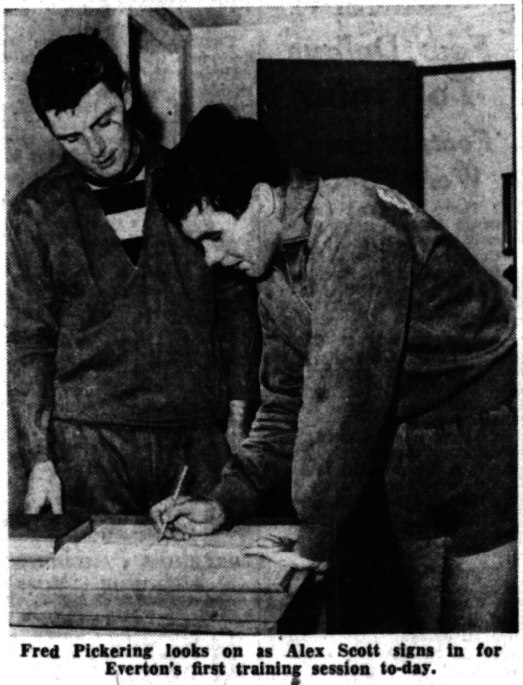
CHAIRMAN JOHN MOORES TELLS EVERTON PLAYERS-
Liverpool Daily Post -Friday, July 23, 1965
WE CAN’T COMMAND SUCCESS, WE CAN WORK FOR IT
MANAGER CLAIMS CLUB’S YOUNGSTERS BEST IN BRITAIN
By Horace Yates
Only Sandy Brown, Everton’s Scottish full back, was missing when the club’s professional staff reported for the first day’s training at Goodison Park yesterday, where they were welcomed by the chairman, Mr. John Moores. Brown had been given special leave because of the death of his father-in-law on Wednesday, to travel to Scotland. Mr. Moore’s address of welcome is always an outstanding feature of this first day. The players look forward to it because they realise that not only is Mr. Moores laying down club policy, but that he does it clearlyencouragingly and entirely without ambiguity. Yesterday he told them they were a team capable of winning either the Football League or the F.A cup. This was no wishful thinking but a considered appreciation of Goodison Park possibilities. “I think we have very good prospects,” he said. “There is a well-known cliché which says you cannot command success but we can work hard for it. If you can be 100 per cent fit, and give us 100 per cent effort all the time you will do well.
CANNOT ASK MORE
“We cannot ask for more than 100 per cent fitness and effort, but we demand that from you. The difference between a very ordinary season and a successful season often like in that little bit of extra endeavour. “At Goodison Park we have a very fine staff, working all out to get from you the best of your ability. If we did not think so we would not ask you to stay with Everton. “Don’t forget our success in your success. If we do well we can give you more and more incentive bonuses. We have got to play good football in League and Cup. Ask me which I would rather win and I would say that either will do- and we have a team that can do it. “We are again competing in the Inter-Cities Fairs Cup. If we do well it means extra earnings and trips to the Continent and play in a higher grade. “This might easily lead to the highest honours in the game. “I have been reading lately there have been fewer offences on the field. I don’t know if this is the result of the F.A.’s “Get tough” policy or whether referee’s have been keeping a tighter control. I prefer to think it is because you are developing more responsible towards the game.
HIGH REWARDS
“Rewards for footballers have never been higher. We want that to be maintained and even increased, but remember it isn’t all one-way traffic. You want to earn big money. We expect you to be responsible people. The footballer’s image has become a little tarnished over the last few seasons. “Let is join together to see if we cannot improve it. Each can help by his actions on and off the field. “It should be a player’s proud boast to say; “I am a professional footballer. It is a calling of which you should be proud.” Turning to referees, Mr. Moores said; “They are the boss on the field, I would not like to be a referee. In the tense atmosphere, it is difficult to make a spilt-second decision. Often it is such a close thing that whichever way he decides one of the teams will be upset. “We have to have someone in charge, otherwise it would be chaos. Everton range themselves strongly behind referees. Our players must exercise discipline. Because we are a skilful team it makes it necessary not to play into the hands of rough opponents. “We would punish you of you brought the good name of the club into disrepute. We are proud of our reputation and we must stand behind the F.A. I feel you will stand behind me.” The chairman congratulated the team on their efforts last season. Hethought they did extremely well to finish fourth despite the crippling injuries that were suffered. There were congratulations too for the other club sides, with a special word for the youth team. “We can feel very satisfied for the future with such youngsters coming up,” Mr. Moore said.
FATHERLY ADVICE
The chairman concluded with a fatherly word of advice “Stanley Matthews,” he said, “did not last as a player until he was fifty by drinking and smoking. You have to dedicate yourselves to your game. “You have to be completely fit. I would advise you- don’t drink don’t smoke. Don’t stay out all night at night clubs and expect to be chosen for England I hope I have not been too much of a square. It is a magnificent life and I want you to enjoy it. Mr. Harry Catterick manager, announced the signing of four fifteen-year-old boys- Alan Whittle, a Liverpool and England inside forward. Frank Thornton, a Scottish international school-boy inside forward; Robert Humphreys, a Cheshire schoolboy goalkeeper, and Billy Brindle a Liverpool and Lancashire schoolboy wing half-back. If Everton could have found star replacements for Tony Kay and Roy Vernon, undoubtedly they would have done so, but as Mr. Moores asks, “Where can we get them?” Mr. Catterick looking back with satisfaction on his four years youth development scheme, expects a successful season, with the opportunity provided for further development of the most promising youngsters. “I think we have a brilliant future,” he said, “I have never known this club to have a brighter looking future. I honestly believe there is no club in Britain as well situated for young players as Everton are today.”
FOOTBALLERS AT BOOTLE
Liverpool Echo and Evening Express- Monday, July 26 1965
Bootle play their annual match against the Everton footballers at Wadham Road to-morrow and Wednesday evening, starting at 6.30. it is expected that Everton will be fielding most of their first team players.
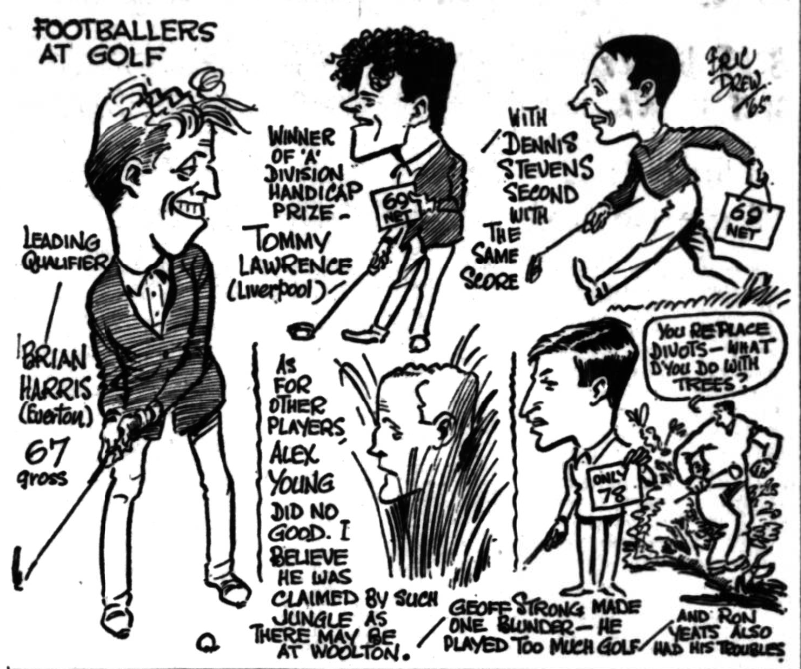
SO BRIAN HARRIS MISSES THE FINAL
The Liverpool Echo and Evening Express- Tuesday, July 27 1965
By Leslie Edwards
Brian Harris, the Everton half-back, hit form with a round of 67 in the qualifying roundfor the professional footballers' golf championship over the Woolton links yesterday. Unhappily, Brian is most likely to be otherwise engaged when the final of the championship takes place, at Childwall, in three weeks’ time. He will be in Oslo with Everton for a friendly match about that time. Several others who qualified yesterday will also have to miss the competition proper because of football commit meets. It was extraordinary how many golfing footballers-or might some of them be footballing golfers--stood on the wrong side of the ball. Left-handers seemed to come uptime after time. If they weren't left-handers, they were people who gripped the club left hand under right-a style favoured by William Ralph Dean , who could hit an iron shot like a professional. The size-or lack of it-in mufti of these great soccer men was unusual, too. Jack Search, himself a fine amateur player in the mid-wars' seasons, fancied his chance physically with any of them. And why not ? He's By a six foot 15-stoner, who would still take a lot of knocking off the ball. A Cup every two. Woolton has changed but little, even if the surrounding area has become much built on, since the far-off days , when Phil Rodgers and Jimmy Bailey used to show their golfing skill at the course. Golfing and football train i ng, according to some managers, does not mix well , but there can be no harm, surely, In this annual get-together of footballing golfers, especially as friendships formed on the links lead to better relations on the field.
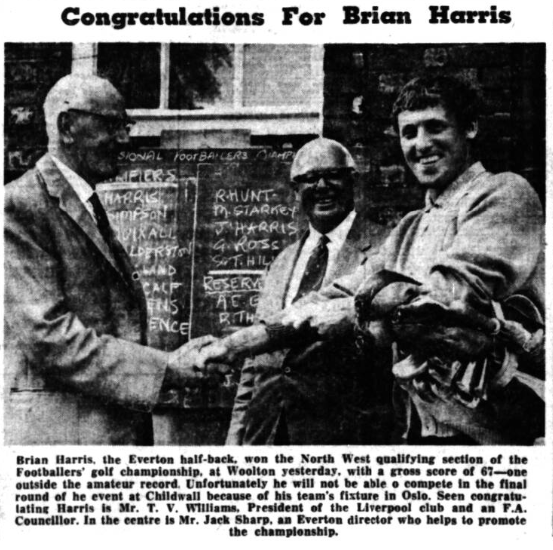
SHOCK ANNOUNCEMENT AT CLUB’S ANNUAL MEETING
Liverpool Daily Post- Friday, July 30, 1965
JOHN MOORES QUITS AS EVERTON F.C. CHAIRMAN
STRONG REASONS, HE TELLS DIRECTORS
In a shock announcement, Mr. John Moores last night announced his resignation as chairman of Everton Football Club. Revealing his intention at the club’s annual meeting, Mr. Moores said he had come to this decision for compelling private and business reasons. Fellow directors were told of Mr. Moores decision shortly before the annual meeting began at Liverpool’s Exchange Hotel. Mr. Moores who is chairman of Littlewoods Mail Order Stores, Limited, became chairman of Everton in June, 1960. He told the surprised meeting last night; “For the past four years I have been very happy to allow my name to go forward as chairman of the directors. But now I have reached the decision that this year I must withdraw my name. there are certain compelling private reasons and in addition, there are business reasons for my decision to resign. “My company have quite a lot of business on the Continent and we are investigating trade there on a much wilder scale” said Mr. Moores. This will mean that I will be travelling a great deal to the Continent in the future, and I will be absent from Goodison. “I do not think it is wise to have an absent chairman in a year when there will bed a number of World Cup matches at Goodison Park. “This being so, I think it would be unwise for me to be chairman-apart from any difficulty I might have myself.
HAPPY TO ACT AS DIRECTOR
Mr. Moores pointed out that at present the club were in a very happy state financially and the modernisation of the club grounds both at Goodison Park and Bellefield-the training ground-is near completion. “in view of this I think that now would be a reasonable time to make a change I will be happy to act as a director of the club. I will give all the assistance I can, because Everton have been very good to me indeed,” he said. Mr. Moores concluded by thanking his fellow directors for their support and said he was very indebted to Mr. Harry Catterick the club’s manager, and Mr. W. Dickinson, the secretary for the good work they had done. Mr. E. Holland Hughes, a director and chairman of the club’s finance committee, described Mr. Moore’s announcement as “very grievous news.” “The loss which the club will sustain when Mr. Moores’ announcement as “very grievous news.” “The loss which the club will sustain when Mr. Moores vacates the chair will be immeasurable,” he said.
A THUNDERBOLT SAYS DIRECTOR
Mr. Holland Hughes said that the news had come as a thunderbolt to him and the other members of the board. “The directors did their utmost to see if he would reconsider his decision, but it was evident that he had considered this matter very closely and carefully. “We on the board are perhaps the only people who know what Mr. Moores has given to the club, not only in patronage that his resources have been able to provide, but in the time and energy he has so unstintingly given for the Everton club,” said Mr. Holland Hughes.
CHOOSING SUCCESSOR TODAY
The Liverpool Daily Post- Friday, July 30,1965
No appointment has been made of a successor to Mr. Moores as Everton chairman. A special meeting of the board will be held at Goodison Park this afternoon, when it is hoped that a new chairman will be chosen.
MAN WHO BOOSTED SOCCER IN LIVERPOOL
The Liverpool Daily Post- Friday, July 30, 1965
By Jack Rowe
Although Mr. Moore’s announcement of his resignation as Everton chairman was a surprise, in the sense that there had been no hint that he had made the decision, he had often indicated that eh did not intend to continue in the chair indefinitely. Two years ago when I was speaking to him in a London hotel after he had flown from Scotland to watch Everton play West ham United in the Goodison Park championship year, he said that he felt his own business commitments would preclude him from carrying on much longer. He has intimated on other occasions that the Everton club were always bigger than the man and that it was far from being a one-man band.
NOTHING BUT THE BEST
Mr. Moores said in his statement to last night’s meeting that his reasons were private and business, and I think one can read into this that the strain might be beginning to tell and that he has also had to think about his health. During his chairmanship at Everton, Mr. Moores has never spared himself in the interests of the club and although he has had his critics especially among people who have not believed that it is a good thing for one man to have so much control, I think his incoming to the position revitalised soccer in this city. He brought his business mind and a determination that nothing but the best was good enough. He believed that Liverpool soccer fans deserved the best and his aim was always to see that they got it as far as he could. He started to pump money into the club and after an investment reckoned at more than £165,000 Everton won the Football league Championship in 1963. Shortly afterwards he lent the club £100,000, interest free, and Everton became known as one of the biggest player-buyers Britain football has known. I believe also that what he did for Everton, and the publicity he brought also gave a boost to his friends across the park at Anfield. They could not afford to be left behind. Two championships, and F.A Cup victory and a wonderful run in Europe in three seasons, even if only one of the championships was won by Everton, is a great achievement for any city and I think the new image Mr. Moores brought to the game on Merseyside played a tremendous part in it. For the record, while he was chairman, Everton signed Fred Pickering, Ray Wilson, Jimmy Gabriel, Tony Kay, Alex Scott, Alex Young, Alex Parker, Gordon West, Tony Stevens, Johnny Morrissey and Sandy Brown. Everton directors Mr. Moores among them, now have to elect a new chairman. I think it will be Mr. Holland Hughes who has worked so closely with Mr. Moores.
EVERTON F.C. NAME NEW CHAIRMAN
The Liverpool Echo and Evening Express- Friday, July 30, 1965
MR. HOLLAND HUGHES ELECTED BY DIRECTORS
SPECIAL MEETING AFTER MR. MOORES’ RESIGNATION
By Michael Charters
F.C. directors, at a special meeting to-day elected Mr. E. Holland Hughes as chairman to succeed Mr. John Moores, whose resignation from the chair shocked the shareholders at the annual general meeting of the dub last night. The choice of Mr. Holland Hughes was expected. He has been chairman of the club's finance committee and has become the leading spokesman for the club whenever Mr. Moores was absent on business or holiday during the past few years. Mr. Hughes became a director in 1958.
A BUSINESS ASSOCATE
He is a senior partner of one of Liverpool's leading firms of solicitors, and in 1958 was president of the Law Society of Liverpool. Before his election to the Everton board, he was secretary of the Pool Promoters' Association, but resigned that position. He had been connected with the pools industry from the pre-war era and has been a close business associate of Mr. Moores since those days. After graduating with honours from Liverpool University, he was admitted a solicitor in 1926, and since that time he has become one of the best-known legal figures in the city. The Everton Board also decided to-day to elect Mr. John Sharp as vice-chairman. Mr Sharp is the senior director, having joined the Board in July, 1946. He is a son of the former Everton and England footballer, and Lancashire and England cricketer, Jack Sharp, who was also an Everton director. Mr. Sharp was vice-chairman in 1959 when Mr. Fred Micklesfield was elected chairman. The following year, when Mr. Moores, became chairman, the position of vice-chairman was not filled and has been vacant during the five years Mr. Moores was in the chair. Mr. Sharp, a former captain of Woolton Golf Club, is a well-known figure in Merseyside sporting circles.
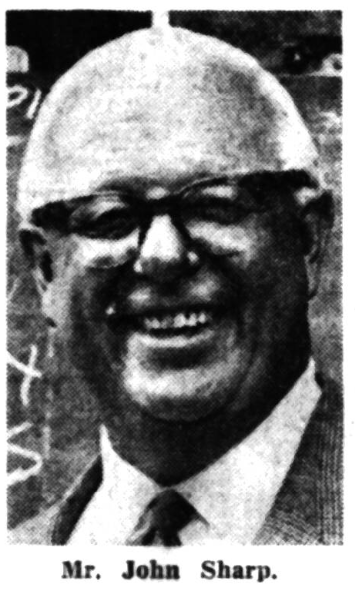
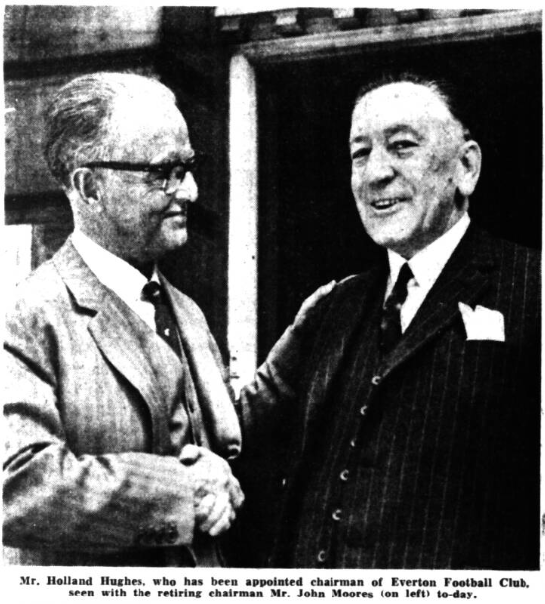
JOHN MOORES’ IMPACT REVITALISED THE CLUB
The Liverpool Echo and Evening Express- Friday, July 30, 1965
By Michael Charters
When Mr. John Moores announced to the startled shareholders at Everton's annual general meeting last night that he was resigning as chairman, but staying on as a director, it signalled the end of a five-year era during which Everton became the most talked-about club in the game, in part, due to the personality of Mr. Moores, and the impact he had on the club's affairs. He demanded success when he took over in June, 1960, and Everton's record since his arrival, including the winning of the League Championship two years ago, reveals that his personal drive from the top revitalised the club. It is estimated that he provided the club with money in the region of £250,000 in the form of an interest-free loan over the years and this has been used in big transfer deals and also in making Goodison Park the finest club ground in the country. In addition to hard cash, Mr. Moores was able to help the club in many other ways. To use the phrase of director Mr. Holland Hughes last night, "they had the patronage which his great resources were able to provide." Mr. Moores made It perfectly clear to the shareholders that he was happy to stay on as director and would help the club as he had done in the past. He told me that he disliked the tags which had grown up during his years as chairman: he disliked being called " Mr. Everton " and hearing the club called "The Millionaire Club." He said: "The club is greater than any man. I have made many friends in football and it has been a great personal satisfaction to me to be associated with Everton." -Mr. Moores stressed that it was mainly business reasons which brought him to this decision. He told me that his firm were hoping to establish chain stores on the Continent, for which he had the encouragement of the Government in helping the export drive. They were hoping to make a start in Italy and he would be spending a great deal of his time there.
COMPELLING
Mr. Moores told the meeting last night: "For the past four years I have been very happy to allow my name to go forward as chairman of the directors. But now I have reached the decision that this year I must withdraw my name. "There are certain compelling private reasons and. in addition, there are business reasons for my decision to resign. "This will mean that I will be travelling a great deal to- the Continent in the future, and I will be absent from Goodison. "I do not think it is wise to have an absent chairman In a year when there will be a number of World Cup matches at Goodison Park. "This being so, I think it would be unwise for me to be chairman—apart from any difficulty I might have myself." Mr. Moores pointed out that at present the club were in a very happy state financially and the modernisation of the club grounds both at Goodison Park and Bellefield - the training ground - is near completion. "In view of this I think that now would be a reasonable time to make a change. I will be happy to act as a director of the club. I will give all the assistance I can, because Everton have been very good to me indeed," he said. Mr. Moores concluded by thanking his fellow directors for their support and said he was very indebted to Mr. Harry Catterick. the club's manager, and Mr W. Dickinson. the secretary, for the good work they had done. Mr. Hughes. Chairman of the club’s finance committee, described Mr. Moores’ announcement as “very grievous news.” “The loss which the club will sustain when Mr. Moores vacates their chair will be immeasurable,” he said.
PATRONAGE
Mr. Holland Hughes said that the news had come as a thunderbolt to him, and the other members of the board. “The directors did their utmost to persuade Mr. Moores to see if he would reconsider his decision, but it was evident that he had considered this matter very closely and carefully. “We on the board are perhaps the only people who know what Mr. Moores has given to the club, not only in patronage that his resource have been to provide, but in the time and energy he has so unstintingly given for the Everton club."He added: "We have had great chairmen. The foundation of this club and the wonderful ground we have was laid by past chairmen. "But I would not hesitate in saying that no past chairman could and in fact any future chairman will be able to emulate the work, effort and benefit that Mr. Moores has conferred on this club during his distinguished chairmanship." From the floor one shareholder commented: “Mr. Moores has said that he has received support from the shareholders but I would say that respect comes were respect is due. I am sure everyone admires the work you have done and I would thank you on their behalf."
END OF BIG FEES BY EVERTON
The Liverpool Echo and Evening Express- Friday, July 31 1965
By Michael Charters
Everton manager Harry Catterick made it quite clear to the shareholders at the club's annual general meeting last night that the era of the big transfer by Everton was over. Home-grown talent of vast potential would render it unnecessary. He explained that in his association with the club stretching over the past 30 years Everton had never been wealthier in its young talent than at present. He was sure that those who had seen Everton win the F.A. Youth Cup last season would appreciate the value of the young players on the books. In his usual lucid report to the shareholders, Mr. Catterick said that in a successfulwas of paramount importance, but to the manager the greatest satisfaction was development of young players. "We now have some of the finest young players in country and in the next 18 months or so the further development of these players should put the club in the position were huge transfer fees will be a thing of the past." "This youth policy is one which will bear fruit over the years to come and I think this is something which must be pursued at all times." Since the players started training again a week ago Mr. Catterick said he had noticed a far greater sense of comradeship and club and team spirit. He was convinced that this was due to the presence of home- bred players within the club.
CRITICISMS
Mr. Catterick asked the chairman for permission to reply to criticisms from two shareholders over Everton's style of play. Mr. D. McPhail asked if the players could be coached more in the use of the long pass, to be more direct, and not to copy the Continental-style tactics like so many English clubs were doing. Mr. D. J. White wanted the manager to encourage the ball-playing type of man rather than those who relished in physical contact. Mr. Catterick, replying to Mr. McPhail, said that in the highly competitive football in this country at present, the use of the defensive tactic had become of paramount importance. Every manager would like to produce a team which played purely delightfulfootball, but it was doubtful if such a team could be successful.
In reply to Mr. White, the manager said that every player needed three attributes-skill, courage, and the need to withstand physical contact. He was sure that his record as manager, with Sheffield Wednesday and Everton would bear comparison with any in the game. Mr. John Moore, the chairman said the directors had brought up this point with Mr. Catterick in the past and they were satisfied with the manager’s decisions. It was little use to a club if the team played attractive football which only succeeded in landing them in the Third Division. He suggested that the shareholders should show their confidence in Mr. Catterick’s judgement. This was proposed by Mrs. E. Jones, seconded by Mr. White, and carried with applause. Replying to another question Mr. Catterick said that Alex Young and Dennis Stevens, both of whom had cartilage operations towards the end of the season, had recovered well and should be fully fit and available for selection by the start of the season.
KAY DEFENCE
Following a question on the increase in accountancy and legal charges from £718 in 1964 to £2,936 this year, Mr. E. Holland Hughes explained that the club had paid for the defence of Tony Kay in the legal action in which he was recently involved. This, he said, had amounted to £1,500. "We thought it right and proper to pay, for the defence of Kay. We thought it prudent to make absolutely sure that his defence was presented in the best possible way," he said. Mr. White asked that in view of the fact that the incidents happened while Kay was at Sheffield Wednesday had the question of retrieving any money from the club been considered. Mr. Hughes said that the suggestion had not escaped the Board's notice and they had given the matter great consideration. Directors re-elected unanimously were: Mr. N. W. Coffey. Mr. F. Micklesfield and Mr. J. Taylor.
DIRECTORS MAKE THEIR CHOICE
Liverpool Daily Post- Saturday, July 31, 1965
MR. HOLLAND HUGHES NEW CHAIRMAN OF EVERTON F.C.
Everton have a new chairman. Little more than twelve hours after hearing Mr. John Moores announce his resignation, the directors Mr. Moores with them, held a special meeting and named Mr. Holland Hughes as his successor, a choice which had been generally expected. And for the first time for five years the club also has a vice-chairman, Mr. Jack Sharp son of the former Everton and England footballer and Lancashire and England cricketer. Mr. Holland Hughes who is a senior partner in a leading Liverpool firm of solicitors has been close business associate of Mr. Moores for a long time and in 1958 was president of the Law Society of Liverpool. His election as chairman was not unexpected because he has been chairman of the club’s finance committee and acted as Everton’s leading spokesman whenever Mr. Moores was away on business or on holiday. Mr. Sharp, who has been an Everton director since July 1946, actually takes over the position he held in 1959 when Fred Micklesfield was elected chairman. When Mr. Moores took over as chairman the position of vice-chairman was not filled and has been vacant until yesterday. Mr. Sharp a former captain of Woolton Golf Club, won the golf competition for football club directors over his home course last Monday. Mr. Hughes said last night “I am conscious of the great responsibility which falls upon me to following such a great chairman as Mr. Moores, but I am given confidence by the knowledge that I have the full support of all my colleagues, manager Harry Catterick and all his staff.
July 1965